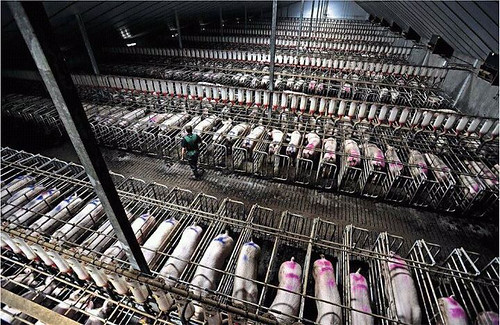It's all about trade and commodities.

Last week, on the sidelines of RIO +20, Brazil and China have jointly reinforced their financial cooperation with a financial reserves $30bn swap arrangement aimed at reinforcing trade and resistance to financial shocks from Europe and the USA.
According to the Guardian
China has overtaken the US as Brazil's major trading partner with a 17% share of the total. Critics say the trade is unbalanced because China buys commodities and sells higher-value goods. Mantega said the new deal would involve more trade diversification, including Chinese purchases of aircraft made by Embraer, a Brazilian manufacturer and Chinese investment to build oil drilling platforms in Brazil. The two countries will also jointly launch two satellites, one this year and another in 2014 and set up culture centres and language networks in each other's countries.In Brazil, the global export of meat and commodities has been one of the biggest drivers of deforestation in the Amazon for cattle and conversation of the cerrado (native savannah) for agriculture.
Trade will also continue to focus heavily on China's demand for commodities, which have helped Brazil resist the downturn in the global economy. "The expansion of trade with China can be infinite," said Mantega, who was speaking on the sidelines of the Rio+20 sustainability conference. "China is fast growing and wants to stimulate consumption so they will continue to buy our commodities. There are no limits."
In the US, where native prairies are long gone, the global demand is playing out like this:

Meatifest destiny: How Big Meat is taking over the Midwest
(reposted from Grist)
When the Des Moines Register ran a front-page story last week, calling into question the growth of concentrated animal feeding operations (CAFOs) in the state, it wasn’t environmentalists or animal rights activists who went on record against the facilities. No, the article featured ex-hog farmers who have been vocal in opposing new factory farms, as well as several Iowans who don’t want to see huge facilities — nor the “poo lagoons” that go along with them — take over the landscape.
Some 19.7 million pigs are raised in Iowa CAFOs every year, and that number is likely to keep climbing. A chart of livestock construction permits that ran with the Register story certainly projects growth. It reads:
2006……………310That’s right, after a “slump” in 2009 and 2010, the industry is back to its CAFO-building ways, with 91 permits issued so far this year. And remember, these are not small facilities; according to the Register, each facility contains around 4,400 hogs in two buildings.
2007………….. 252
2008………….. 218
2009……………. 60
2010…………….. 62
2011……………. 132
2012 (by 6/07).. 91
Looking at these numbers, it’s easy to wonder: How much longer can the state (or the region for that matter) handle this kind of growth? When the nonprofit advocacy group Food and Water Watch created this Factory Farm Map back in 2007, Iowa was already one of the states most saturated with CAFOs (see image). According to the chart above, over 500 CAFOs may have been built since then. Of course not all that growth has to mean new operations — some permits may be for the expansion of preexisting buildings — but if even half that number resulted in new facilities, it’s a cause for concern.
Why exactly do we need so many new CAFOs if American meat consumption has gone down? The answer — as it is with so much economic growth these days — is China. Apparently, they’ve gone a little pork-crazy over there. And China just surpassed us as the nation with the biggest meat-tooth in the world (we’re still ahead of them on a per capita basis, but they have a lot more people than we do).
Another recent article in the Iowa Farm Journal reports on new free-trade agreements with South Korea, Colombia, and Panama, but zeroes in on China as the ultimate target of U.S. pork industry expansion. It quotes Laurie Hueneke, U.S. director of international trade policy, saying, “The biggest prize is China.”

No comments:
Post a Comment